Professional Courses
Industry-relevant training in Business, Technology, and Design
Categories
Interactive Games
Fun games to boost memory, math, typing, and English skills
Typing
Memory
Math
English Adventures
Knowledge
A Realistic Guide on How to Score 200+ in JEE Main

Scoring over 200 in JEE Main is a dream for many students. It’s not just a number. It’s a milestone that gets you closer to top engineering colleges like NITs, IIITs, and even makes you eligible for JEE Advanced. The good news is, this target is absolutely achievable. You don’t need to be a genius. You just need a smart plan, consistent efforts, and the right support system.
In this guide, we’ll walk you through everything you need to do to reach that 200+ mark. From understanding the exam pattern to using platforms like AllRounder.ai to stay ahead, every step is covered in a practical, no-nonsense way.
Why Aim for 200+ in JEE Main?
A score of 200+ in JEE Main usually means you’re in the top 5–10% of test takers. That puts you in a strong position for admissions to premier institutions like NIT Trichy, NIT Warangal, IIIT Hyderabad, and others. It also makes you eligible to appear for JEE Advanced, which opens the gate to IITs. So even if you're unsure about IIT, aiming high in JEE Main gives you multiple choices.
Step 1: Know the JEE Main Exam Pattern
Before anything else, you must be crystal clear about the exam pattern. JEE Main consists of three sections: Physics, Chemistry, and Mathematics. Each section has 25 multiple choice questions and 5 numerical value-based questions. You get 4 marks for a correct answer and lose 1 mark for a wrong MCQ. There’s no negative marking for numerical questions.
Download the official NTA syllabus and keep a printout nearby. Strike off topics as you complete them. It feels rewarding and gives you a sense of progress.
Step 2: Make a Practical Study Plan
If you want to score 200+, you need to treat preparation like a long race, not a sprint. Start early, ideally in Class 11. If you’re in Class 12, don’t worry. With focused effort, you can still do it.
Start by identifying where you stand in each subject. Make a list of strong and weak chapters. Break down your syllabus into small weekly goals. Try to complete at least one topic each day, with 50–100 practice questions. Use 1 to 2 hour focused study blocks with short breaks in between. Avoid long, tiring sessions.
Every Sunday, take a small test. Once a month, attempt a full mock paper. That way, you’ll keep checking your improvement while reducing the fear of tests.
Step 3: Build Strong Concepts Using the Right Books
Your understanding of basic concepts will decide your score. For Chemistry, NCERT is non-negotiable. Stick to it for theory, especially Inorganic and Organic. For Physics and Maths, start with NCERT and then move to standard reference books.
Here are some tried and tested ones:
- Physics: H.C. Verma and D.C. Pandey
- Chemistry: O.P. Tandon, N Awasthi (for Physical Chemistry)
- Maths: R.D. Sharma and books by Arihant
Don’t buy too many books. Two per subject is enough. Your goal is to study deeply, not widely.
Step 4: Focus on High-Yield Topics First
Not all chapters carry the same weight. Some topics appear more frequently and are easier to score. Start with these.
High-Yield Chapters:
- Physics: Mechanics, Current Electricity, Optics, Modern Physics
- Chemistry: Chemical Bonding, Mole Concept, Coordination Compounds, Organic Reactions
- Maths: Calculus, Algebra, Coordinate Geometry, Probability
Mastering these gives you a strong base to build your 200+ score.
Step 5: Practice Questions Every Day
Consistency beats cramming. Practice questions daily to strengthen your grasp. Aim for a healthy mix of easy, medium, and tough. Start with concept-based questions and move to application and mixed problems.
After completing a topic, take a quiz. You’ll get instant feedback on your understanding. You can use tools like AllRounder.ai quizzes to reinforce what you’ve learned and make revision more fun.
Step 6: Solve Past Year Papers and Mocks
Mocks help you test your readiness. Past JEE papers help you understand the type and difficulty of questions. In the last 6 months, try to solve at least 30–40 full-length mocks. Take at least 2 mocks per week in the last month.
Sit in a quiet place. Set a timer. Use only a pen and paper. Simulate the real exam atmosphere as closely as possible. After the mock, review every question, both correct and incorrect.
Try AllRounder.ai mock tests to simulate the real exam.
Step 7: Maintain an Error Log and Analyse Mistakes
Scoring high is not just about solving questions. It’s about solving them right. After every mock or quiz, sit down and analyse your mistakes.
Make a notebook just for this. Write down your errors and the correct method. Revisit this notebook once a week. Over time, you’ll start seeing fewer repeated mistakes. That’s real improvement.
Step 8: Learn Time Management for Study and Exam
Time is your biggest asset. Use it well. For studying, try the Pomodoro technique to study for 25 minutes, then rest for 5 minutes. After four cycles, take a longer break.
On exam day, start with your strongest section. Don’t waste time on one question for too long. Skip and come back if you’re unsure. Keep track of time so you’re not rushing at the end.
Step 9: Use Smart Revision Techniques
Understanding is not enough. You must retain it. Use spaced repetition for better memory. Revise each topic after 1 day, 1 week, and 1 month.
Create flashcards for formulas, concepts, and exceptions. Make cheat sheets for each subject. You can also teach a topic to someone else or to yourself out loud. This is called the Feynman technique and it works wonders for understanding and recall.
Try AllRounder.ai flashcards and revision reminders to stay sharp.
Step 10: Take Care of Your Health and Mind
Your body and brain are your biggest tools during JEE prep. Sleep for at least 7 to 8 hours. Eat healthy food. Take small walks. Stay physically active.
Also, don’t forget to relax. Watch your favourite cartoon, talk to a friend, play a game, or listen to music. If you feel anxious, practice breathing exercises or meditation.
Step 11: Use AllRounder.ai for Complete Support
JEE Main preparation is easier when you have a solid platform supporting you. AllRounder.ai is designed to help you prepare better and smarter.
Here’s how it can help:
- Topic-wise quizzes and flashcards
- Full-length timed mock tests
- Performance tracking and analysis
- Smart revision schedules
- Personalized study plans
Whether you're revising topics or tracking your progress, AllRounder.ai is like your digital study buddy.
Step 12: Plan Subject-Wise Strategies
Each subject needs a different approach. Let’s break it down.
Physics:
Focus on concepts and problem-solving. Derivations are important. Don’t skip units and dimensions or modern physics.
Chemistry:
Stick to NCERT. Practice Organic reaction mechanisms, Inorganic exceptions, and Physical numericals regularly.
Mathematics:
Clarity of formulas is key. Revise daily. Solve mixed topic questions. Use timed quizzes to increase speed.
You can find helpful practice resources across subjects on AllRounder.ai.
Step 13: What to Do in the Last Month Before JEE Main
This is the most crucial phase. Use the last month wisely. Here’s what you should focus on:
- Solve one full mock test every day
- Revise only the most important topics
- Go through all your error logs and formula sheets
- Practice flashcards for revision
- Sleep well and avoid stress
Create a routine that mirrors the actual exam day. Practice giving your mock tests during the exact time slot of your actual JEE Main paper.
Step 14: Tips for the Exam Day
The final day is all about staying calm and following your plan.
- Reach your centre early. Don’t rush.
- Carry your admit card, photo ID, and a transparent water bottle.
- Start with the questions you know. Build momentum.
- Use elimination for tricky MCQs.
- Don’t panic if one section feels tough.
- Keep track of time and don’t get stuck.
If you stay composed, you’ll perform much better than expected.
Topper Insights to Stay Inspired
Real stories inspire real results. Many JEE toppers have shared their simple but effective strategies.
Arenjay Das, who scored 99.9 percentile, focused on playing football to unwind and practiced questions daily.
Hans Daruka, a state topper, stressed on building a solid Maths base and avoiding distractions.
Most toppers say the same thing, stick to NCERT, revise regularly, practice mocks, and take care of your health.
Final Takeaways: How to Score 200+ in JEE Main
You don’t need magic to score 200+ in JEE Main. You need a clear plan, regular practice, and a little bit of belief in yourself. Here’s your roadmap one more time:
- Understand the exam pattern well
- Start early and set small, achievable goals
- Build your base using NCERT and reference books
- Focus on high-weightage chapters
- Solve questions and take quizzes every day
- Take mocks regularly and learn from your mistakes
- Revise smartly using spaced repetition
- Take care of your physical and mental health
- Use AllRounder.ai to stay consistent and track progress
- Stay calm and follow your strategy on exam day
Scoring 200+ might sound tough now. But with each chapter you complete and every mock test you solve, you’re getting closer. Stay focused, and don’t let short-term struggles take away your long-term dream.
You’ve got this.

Learn how negative marking works in JEE Main 2025 and how to avoid it with practical, proven strategies.

Learn how to prepare for JEE Main 2025 with a proven, winning strategy. Get a detailed plan, subject-wise tips, and...

Learn the chapter-wise weightage for JEE Main 2025 across Physics, Chemistry, and Maths. Prioritise smartly and...

Discover the most important chapters for JEE Main 2025 across Physics, Chemistry, and Maths. Focus your prep smartly...

Discover top JEE Main books for Physics, Chemistry & Maths. Learn how NCERT & reference books pair with AllRounder.
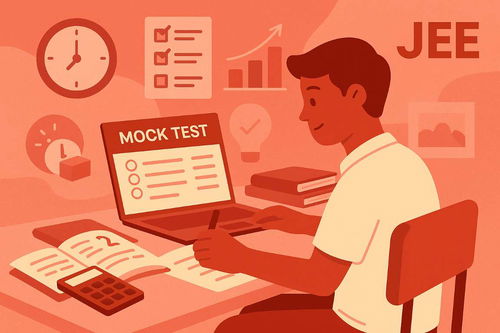
Looking for free JEE Main mock tests to boost your preparation? Discover the best platforms, tips, and strategies to...

Discover what scores and percentiles are needed to secure seats in top NITs, IIITs, and GFTIs. Learn how category...
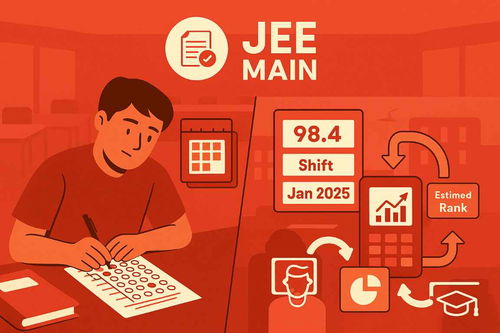
Understand the exact difference between JEE Main percentile and rank. Learn how scores are normalized across...

Understand the JEE Main scoring system to maximize your result. Learn the marking scheme, how to handle negative...

Confused about the JEE Main attempt limit? This guide clarifies how many times you can appear, the eligibility...

Wondering how many times you can appear for JEE Mains? This guide explains the total attempts allowed, session...
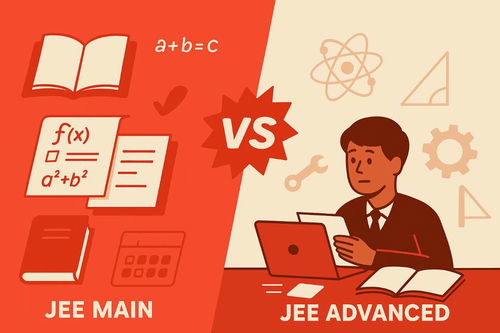
Discover the key differences between JEE Main and JEE Advanced in terms of syllabus, pattern, difficulty, and prep...

Confused about JEE Main qualification rules? This blog gives you a detailed checklist of eligibility criteria,...

Explore this simple, step‑by‑step guide to the JEE Main counselling process. Learn how to register, fill choices,...

Curious about how many times SC students can attempt JEE Main? This complete guide covers JEE Mains attempt rules,...

Want to score 200+ in JEE Main? This practical guide gives you proven tips, subject-wise strategies, mock test...

Wondering how the JEE Main exam is structured? This complete guide breaks down the official JEE Main exam pattern...
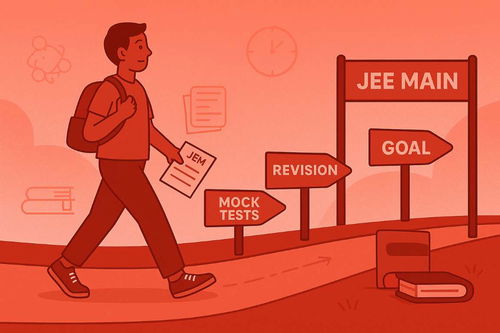
Learn how to crack JEE Main on your first attempt with proven strategies. This guide covers planning, conceptual...
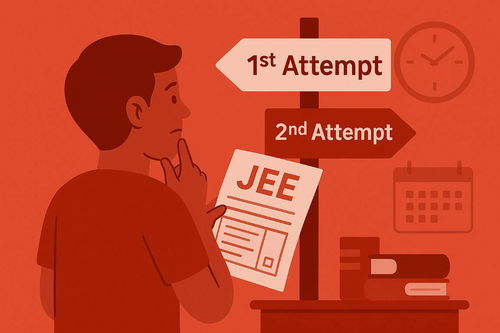
Learn how many JEE Main attempts you can take after Class 12. This guide covers eligibility, attempt limits, subject...

Learn about the JEE Main age limit requirement and key eligibility rules. Understand the attempt policy, Class 12...

Discover the most important topics for the JEE Main exam in Physics, Chemistry, and Mathematics. Learn subject-wise...

Get a subject-wise preparation strategy for JEE Main step-by-step using smart tips and trusted resources from AllRounder.ai.

Looking to score high in JEE Main 2026? Discover expert preparation tips on creating smart study plans, mastering...

Confused about JEE Mains eligibility? This detailed guide explains JEE Mains eligibility criteria including...
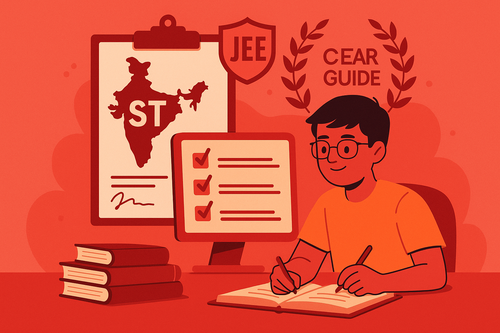
Confused about JEE Main Attempts for ST Category? This detailed guide covers attempt limits, age relaxations,...
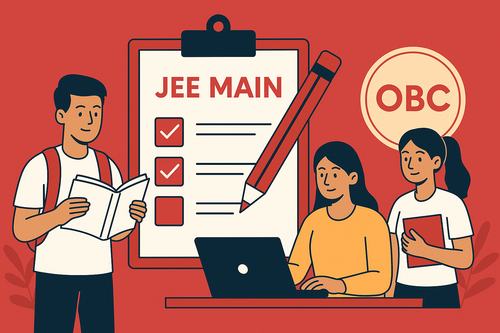
Wondering how many times OBC candidates can appear for JEE Mains? This detailed guide explains JEE Main Attempts for...

Dropping a year for JEE Mains? This in-depth strategy guide helps droppers optimise their JEE Main attempts with...

Confused about how many times you can appear for JEE Main? This guide explains the number of JEE attempts, session...
Resources
-
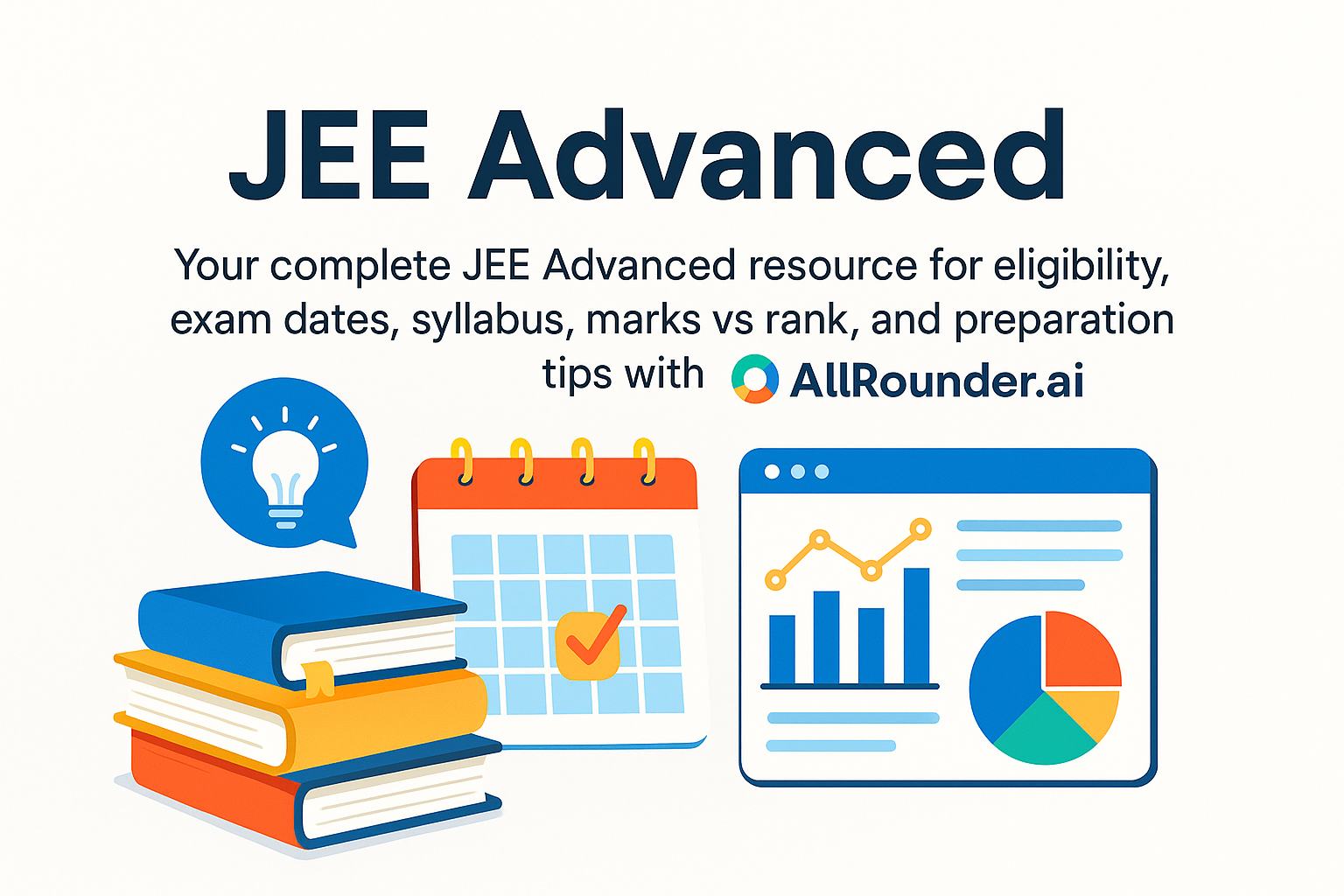
Your complete JEE Advanced resource for eligibility, exam dates, syllabus, marks vs rank, and...
-
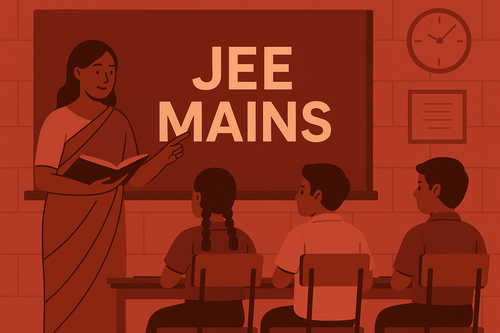
Understand the entire JEE Main process, from application and eligibility rules to the exam...
-

Explore the IB Board – a global curriculum emphasizing holistic, student-centered learning...
-

Learn about CBSE – India’s national school board offering a standardized curriculum, NCERT...
-

Explore everything about the ICSE board – its curriculum, subjects, exam format, and academic...
